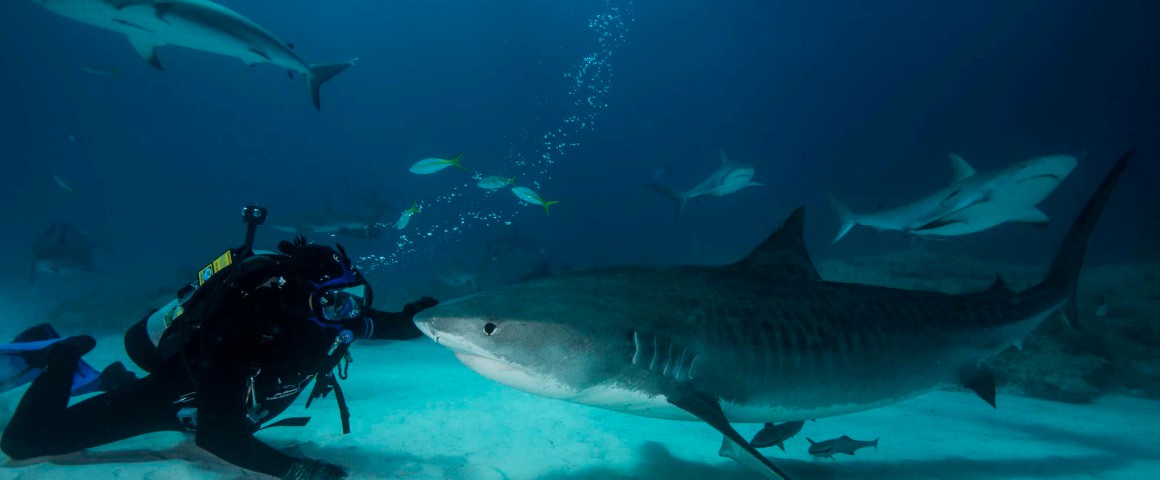The US-born Eric Cheng is often described as a Taiwanese American underwater photography specialist, but looking at his long list of entrepreneurial and philanthropic achievements, it would be more accurate to call him a polymath.
Having been born in 1975 in Madison Wisconsin, Eric went on to study at Stanford University. In the time since then he’s not only become a name in the drone photography industry (he is currently serving as director of drone company, DJI), he also owns and manages Wetpixel, an underwater photography community website. He is also currently serving as ‘head of immersive media’ at Facebook. On the side of marine conservation, he has served on the board of directors of Shark Savers and the board of advisors for the Sea Shepherd Conservation Society. Believe it or not, that’s just a brief summary of his expansive curriculum vitae.
“We’re taking sharks out of the ocean at an unsustainable rate, and for no good reason.”
Now, Eric is joined by shark diving expert Jim Abernethey in the recently launched photography adventure series produced by Canon Australia, ‘Tales by Light’ Season 2, in which a message of conservation is paired with Eric’s amazing underwater shots.
Wild spoke with Eric and Jim in the lead up to the launch of the new series to learn a little more about their motivations and views on shark conservation.
“We’re taking sharks out of the ocean at an unsustainable rate, and for no good reason,” Eric explains. “Sharks are predominantly killed for their fins, which are used in shark fin soup – a date practice in Asia that serves no real purpose in today’s world.”
Eric goes on to highlight the critical role that sharks have in marine ecosystems, taking the place of apex predator, as well as a key scavenger. Both these functions serve to help maintain a delicate equilibrium in those ecosystems, and without them the entire system is at risk. When you consider that a huge proportion of the Earths oxygen output and carbon storage occurs as a result of these systems, the sharks’ survival becomes linked to our own.
“Shark conservation organisations around the world are rallying together to fight against senseless finning through education, media campaigns, legislation, and more. It’s not too late to keep sharks around for the next generation,” Eric says.
And it’s the work of these specialists, and many others like them, in creating stories and sharing experiences that is drawing more attention to the current situation. While Eric remains optimistic about our ability to change direction, he says it’s critical that more and more people learn about vulnerable places and species.
“The best thing people can do to help in shark and ocean conservation is to take an interest in the stories the ocean has to offer. I have never met anyone who has spent time listening to stories about the ocean (or better yet, who has spent time in the ocean gathering stories themselves) who has not become a conservationist in some way.”
Jim, who has been an avid diver since the tender age of nine, says his career in diving has allowed him to pursue important conservation work – primarily through raising awareness for the plight of marine life, especially sharks. As one of the foremost cage-free shark diving experience operators in the world, Jim has an opportunity to share his respect for these predators with his clients.
“Statistics prove that diving with sharks, even without a cage, is much safer than many of the things we do on a daily basis,” he says.
“Swimming with sharks removes the misconceptions that most of the world holds in less than five minutes. Because the sharks I swim with are some of the largest of predatory sharks, the guests continue to respect them. It’s simply the best way to learn about their true nature.”
In presenting their views as both business-minded as well as conservation-focused, Eric and Jim represent a new wave of entrepreneurs who view the slaughter of these keystone species as no less than a threat to our own.
Or, as Jim says: “Killing the controlling species that keep our oceans healthy and in balance – apex predators – is actually killing one of our most important ecosystems, effectively killing ourselves.”
‘Tales by Light’ Season 2 premieres on the National Geographic Channel on the 25th of October.
This story appears in the recently released Wild issue 156. Subscribe today to receive your own copy



